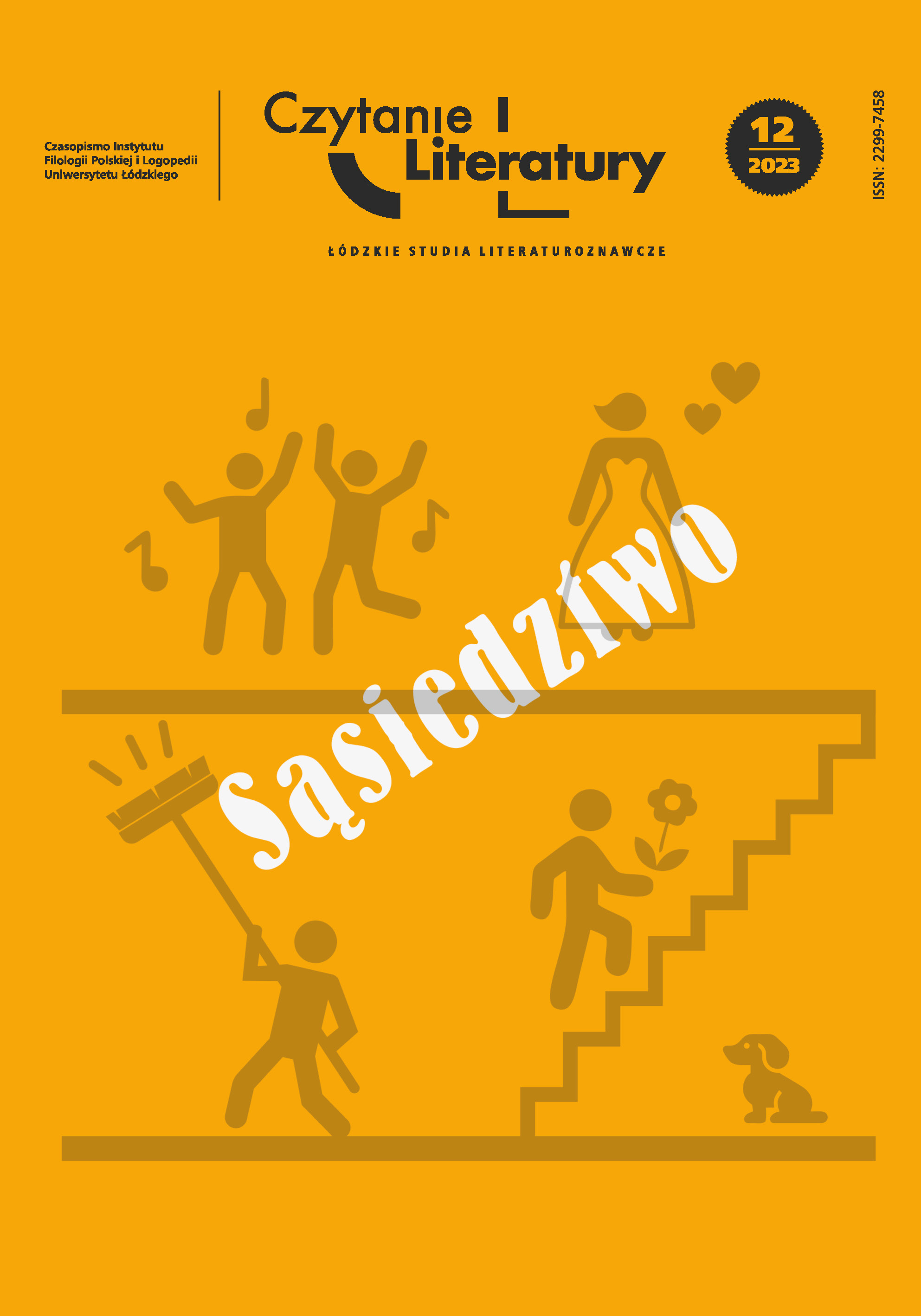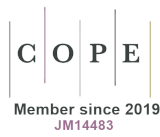Elbing vs. Elbląg. Od spornych ziem do reprezentacji dekolonialnych
DOI:
https://doi.org/10.18778/2299-7458.12.07Słowa kluczowe:
Ziemie Zachodnie, przesiedlenia, polsko-niemieckie relacje, historia miejska, mapy mentalneAbstrakt
Zmiany terytorialne po II wojnie światowej pociągnęły za sobą istotne zmiany demograficzne: w Elblągu wysiedlono Niemców, a osiedlono Polaków z dawnych ziem wschodnich. Nie tylko narodowa, ale i prywatna historia musiała być tworzona od podstaw. Poprzez badanie różnych rodzajów tekstów i map (wspomnienia, przewodniki turystyczne, literatura, wystawy), w artykule przeanalizowano rozbieżne narracje o mieście i sąsiedztwie z niemieckiej i polskiej perspektywy. Oprócz analizy głównych motywów i strategii narracyjnych, które opierają się na miejskiej wizualizacji pamięci, artykuł kwestionuje popularne pojęcie palimpsestu na rzecz dekolonialnej perspektywy przestrzeni miejskiej. Odpowiedź na pytanie o to, jak wyobrazić sobie miasto poza koncepcjami narodowymi, może stymulować ponowne rozważania na temat hierarchicznych struktur miast.
Pobrania
Bibliografia
Elbing, Press clippings archive of the Herder Institute for Historical Research on East Central Europe, Marburg, Signature P 0325.
Google Scholar
Ewering L., Heimat. Marienburg Elbing Frauenburg, Ostpreußisches Landesmuseum, Signature XI E 2 Ewe 1996.
Google Scholar
Miejska Rada Narodowa i Zarząd Miejski w Elblągu, Komisja odbudowy i planowania, Archiwum Państwowe w Malborku, Signature 1, folder 454.
Google Scholar
Miejska Rada Narodowa i Zarząd Miejski w Elblągu, Sprawy ogólne dot. odbudowy, Archiwum Państwowe w Malborku, Signature 1, folder 466.
Google Scholar
Prezydium Miejskiej Rady Narodowej, Długofalowe plany inwestycyjne, m.in. projekt planu inwestycyjnego na 1953 r. oraz plan perspektywiczny rozwoju do 1960 r., Archiwum Państwowe w Malborku, Signature 53, folder 460.
Google Scholar
Kult, Arahja, 1988, https://lyricstranslate.com/de/arahja-arahja.html-0 [accessed March 2, 2023].
Google Scholar
Oxford English Dictionary, https://www.oed.com/oed2/00169695 [accessed: March 3, 2023].
Google Scholar
Romantische Straße Touristik Arbeitsgemeinschaft GbR, https://www.romantischestrasse.de/en/romantische-strasse/germanys-oldest-and-most-popular–holiday-route [accessed: March 5, 2023].
Google Scholar
Abramowicz M., Brosz M., Bykowska-Godlewska B., Michalski T., Strzałkowska A., Wzorce konsumpcji alkoholu. Studium socjologiczne, Kawle Dolne 2018.
Google Scholar
Ackermann F., Palimpsest Grodno. Nationalisierung, Nivellierung und Sowjetisierung einer mitteleuropäischen Stadt, Wiesbaden 2010.
Google Scholar
Alles Leben ist aus der Stadt gewichen, „Ost-West Kurier” 1959, September 3.
Google Scholar
Bachelard G., Poetik des Raumes, Frankfurt am Main–Berlin–Wien 1975.
Google Scholar
Barczyk Z., Miasto i sens, Katowice 2020.
Google Scholar
Bonkowicz-Sittauerowie M. and I., Elbląg i okolica, Warszawa 1949.
Google Scholar
Ciechorska-Kulesza K., Tożsamość a przestrzeń w warunkach niestabilnych granic. Przypadek byłego województwa elbląskiego, Gdańsk 2016.
Google Scholar
Czarnocki K., Elbląg. Informator turystyczny, Warszawa 1968.
Google Scholar
Elbing – die alte ostpreußische Schichaustadt über dem Haff, “Landeszeitung Lüneburg” 1957, November 4.
Google Scholar
Elbing die verruchte Stadt, “Göttinger Presse” 1957, December 3.
Google Scholar
Elbing ist eine tote Stadt, “Spandauer Volksblatt” 1960, February 7.
Google Scholar
Elbląg. Plan miasta. 1974, PTTK, Sign. 04242.
Google Scholar
Elbląg wciąż pokrzywdzony, “Trybuna Ludu” 1959, July 8.
Google Scholar
Gieba K., A post-German city as a palimpsest in contemporary prose of the Lubuskie Land, “The Polish Review” 2022, no. 2.
Google Scholar
Gliniecki T., Elbląskie okruchy XX wieku, Elbląg 2013.
Google Scholar
Goddard C., Wierzbicka A., Cultural scripts. What are they, and what are they good for?, „Intercultural Pragmatics“ 2004, no. 2.
Google Scholar
Göttinger Arbeitskreis, Die deutschen Ostgebiete jenseits von Oder und Neiße im Spiegel der polnischen Presse, Würzburg 1958.
Google Scholar
Haese J., Verloren in Elbląg. Autobiographischer Roman, Osnabrück 2007.
Google Scholar
Hahn H. H., Hahn E., Flucht und Vertreibung, [in:] É. François, H. Schulze, Deutsche Erinnerungsorte: Eine Auswahl, Bonn 2005.
Google Scholar
Halikowska-Smith T., The past as palimpsest. The Gdańsk school of writers in the 1980s and 1990s, “The Sarmatian Review” 2003, no. 1.
Google Scholar
Hiemer E.-M., Autobiographisches Schreiben als ästhetisches Problem, Wiesbaden 2019.
Google Scholar
Hiemer E.-M., The Family as ‘Best Weapon’. Instrumentalising German health care discourses in Upper Silesia during the Interwar Period, “Journal of Family History” 2023, no. 3.
Google Scholar
Hryniewicka M., Danzig, Gdańsk und seine Geschichte als literarisches Thema in der Prosa von Günter Grass, Stefan Chwin und Paweł Huelle, Göttingen 2008.
Google Scholar
Kijowska J., Kijowski A., Rączkowski W., Politics and Landscape Change in Poland. C. 1940–2000, [in:] D. Cowley, R. Standring, M. Abicht, Landscapes through the lens: Aerial photographs and historic environment, occasional publication of the Aerial Archaeology Research Group, Vol. 2, Oxford–Oakville 2010.
Google Scholar
Knigge A., „Die vor uns hier gelebt haben”: Spurensuche in der polnischen Literatur nach 1989, [in:] R. Jaworski, Gedächtnisorte in Osteuropa. Vergangenheiten auf dem Prüfstand, Frankfurt 2003.
Google Scholar
Kołodziejczyk D., Huigen S., Multimodal palimpsests: Ideology, (non-)memory, affect and the senses in cultural landscapes construction in Eastern and Central Europe, “European Review” 2022, no. 4.
Google Scholar
Kuhstall im Keller, „Eßlinger Zeitung” 1961, December 21.
Google Scholar
Lubocka-Hoffmann M., Miasta historyczne Zachodniej i Północnej Polski: Zniszczenia i programy odbudowy, Elbląg 2004.
Google Scholar
Lubocka-Hoffmann M., Powojenna odbudowa miast w Polsce a retrowersja Starego Miasta w Elblągu. The post-war rebuilding of towns and cities in Poland and the retroversion of the Old Town in Elbląg, „Ochrona Zabytków” 2019, no. 1.
Google Scholar
Madurowicz M., Emocje zapisane na mapach, „Białostockie Studia Literaturoznawcze” 2019, no. 15.
Google Scholar
Miasto z ambicjami, „Kurier Polski” 1960, August 17.
Google Scholar
Murzynowski J., Ruiny i ludzie, [in:] …ocalić od zapomnienia: Półwiecze Elbląga (1945–1995) w pamiętnikach, notatkach i materiałach wspomnieniowych ludzi Elbląga, ed. R. Tomczyk, Elbląg 1997.
Google Scholar
Musiaka Ł., Spatial transformations of selected Masurian cities in the years 1945–1989 in light of qualitative research of their inhabitants, “Prace Komisji Krajobrazu Kulturowego. Dissertations of Cultural Landscape Commission” 2019, no. 2.
Google Scholar
My, Elblążanie, „Trybuna Ludu”, May 20, 1959.
Google Scholar
Orski M., Filie obozu koncentracyjnego Stutthof na terenie miasta Elbląga w latach 1940–1945, Sztutow 1992.
Google Scholar
Phillips J., Storytelling in Earth sciences. The eight basic plots, “Earth-Science Reviews” 2012, no. 3.
Google Scholar
Portret ambitnego miasta, „Głos Pracy” 1960, May 10.
Google Scholar
Przed 17 laty na cmentarzysku-Elblągu, „Express Wieczorny” 1962, February 12.
Google Scholar
Roth R., Cartographic design as visual storytelling: Synthesis and review of map-based narratives, genres, and tropes, “The Cartographic Journal” 2021, no. 1.
Google Scholar
Röger M., Flucht, Vertreibung und Umsiedlung. Mediale Erinnerungen und Debatten in Deutschland und Polen seit 1989, Marburg 2010.
Google Scholar
Schneege H.-G., Langsam frißt der Wald die Stadt auf, “Passauer Neue Presse” 1958, April 5.
Google Scholar
Sywenky I., (Re)constructing the urban palimpsest of Lemberg/Lwów/Lviv. A case study in the politics of cultural translation in East Central Europe, “Translation Studies” 2014, no. 2.
Google Scholar
Wiedersehen mit Elbing, “Schwäbische Zeitung” 1958, February 21.
Google Scholar
Zduniak-Wiktorowicz M., Filologia w kontakcie. Polonistyka, germanistyka, postkolonializm, Poznań 2018.
Google Scholar
Żmudzińska-Nowak M., Heritage as a palimpsest of valued cultural assets on the problems of frontier land architectural heritage in turbulent times. Example of Poland’s Upper Silesia, “International Journal of Conservation Science” 2021, no. 3.
Google Scholar
Pobrania
Opublikowane
Wersje
- 2024-02-09 - (2)
- 2023-12-21 - (1)
Jak cytować
Numer
Dział
Licencja

Utwór dostępny jest na licencji Creative Commons Uznanie autorstwa – Użycie niekomercyjne – Bez utworów zależnych 4.0 Międzynarodowe.










